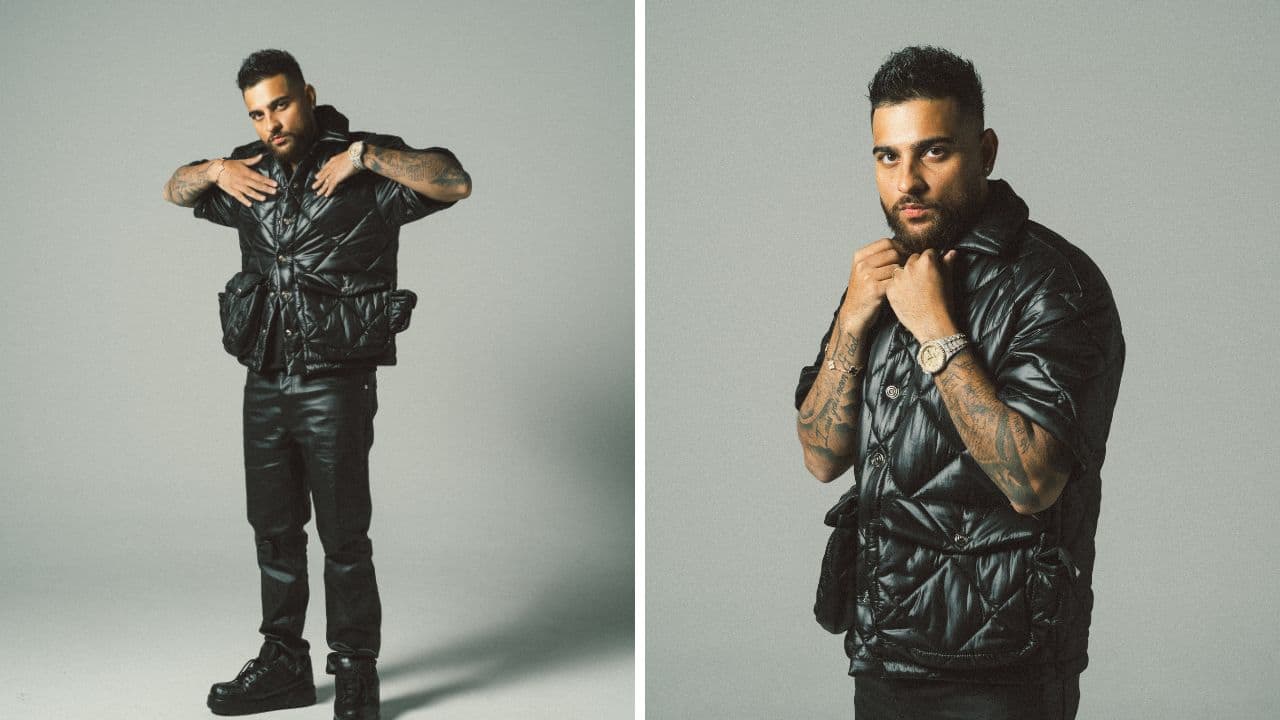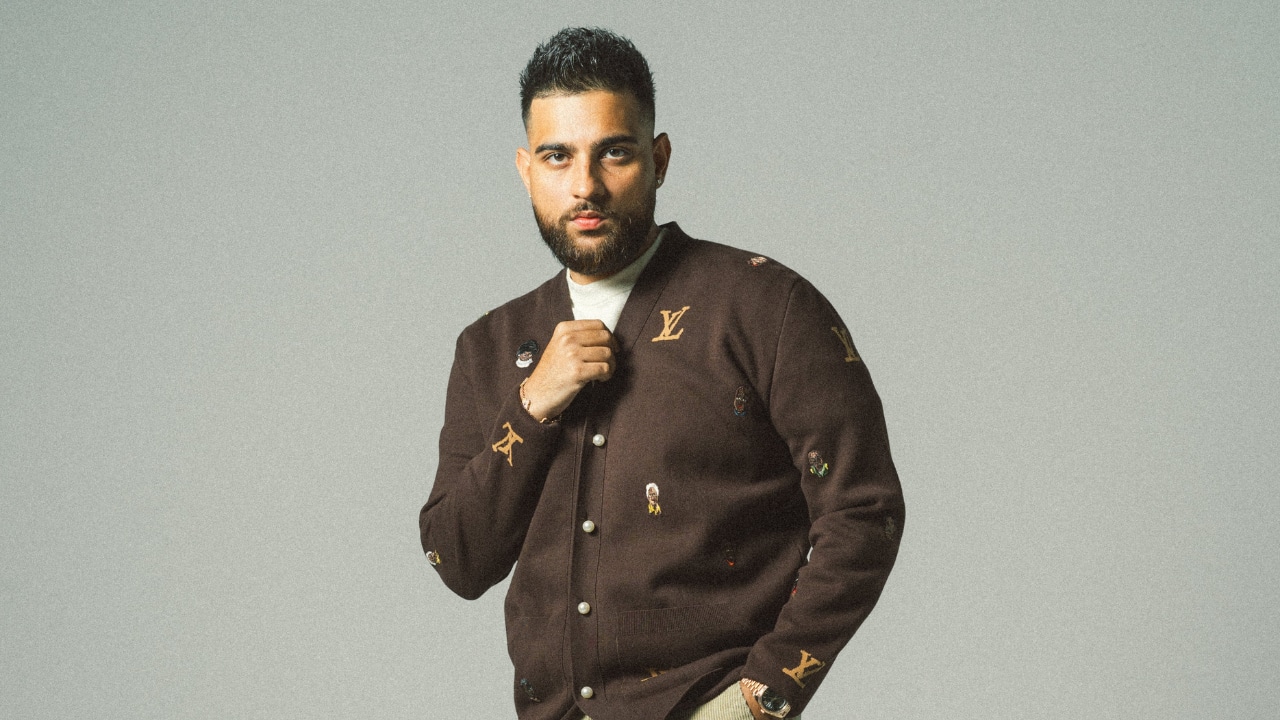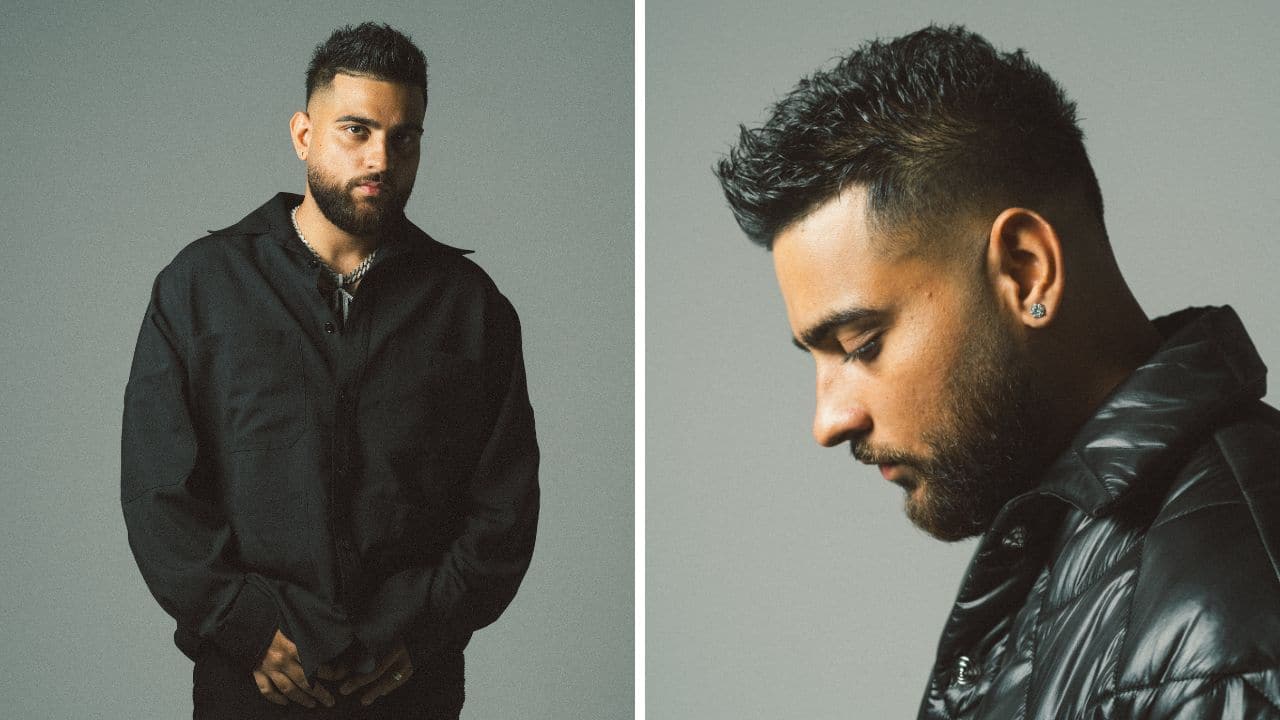



Noted Punjabi singer Karan Aujla, who is going to begin his first ever India tour titled All A Dream World Tour, needs no introduction. He is loved for his famous Punjabi songs Tauba Tauba and Chunni Meri Rang De Lalariya and is a rage not only in India but all over the world.
Karan, who shifted to Canada at the tender age of 9 after the sudden death of his parents in an accident, spoke exclusively to Money Control about all the love he has gotten from his fans, especially in India.
Karan Aujla also revealed to us what makes him come back to India, his home country, and why he wanted to do the India tour.
Karan’s soulful voice and heartfelt lyrics have resonated with fans worldwide, making him a household name. In this exclusive interview, Karan opens about his journey, his music, and the driving forces behind his success.
His early life was marked by tragedy when he lost his parents at the tender age of 9. This loss had a profound impact on his early music, with many of his songs reflecting the pain and longing he felt.
"Those early songs like 'Don't Look' and 'Range'—the pain in them was real. When I wrote 'Jhanjar', I was thinking about how my mother used to get ready for functions. But you know what? That pain became my strength. Those lyrics came from a real place," he shares.
Karan went to Canada to be with his sisters after the tragic death of his parents, and according to him, that opened his eyes to a different culture, a world that he says he would have loved to show his parents as well.
In this interview too, Karan said that after the death of his parents, he went into a shell, and it was only his songs that kept him going. His brother-in-law once read his diary and told him that these were songs, hence Karan’s journey in music began.
Karan is now one of the most loved artists; his song Tauba Tauba featuring Vicky Kaushal was a smashing hit. Karan says it is after this song that he saw ‘non-Punjabi fans singing every word, feeling every beat. That's when I realized music really has no language. It pushed me to think bigger, to experiment more.”
Karan's music often touches on themes of love, heartbreak, and social issues. Karan said he believes in using his platform to raise awareness about important topics and inspire change.
"When I write about inequality in 'Facts' or about staying grounded despite success in 'Proud,' it's because these are real issues affecting our youth. Whether it's love songs like 'Haan Haige Aa' or deeper tracks like 'Jhanjar', every lyric has a purpose—to connect, to heal, to make people feel they're not alone in whatever they're going through," he explained.
The use of artificial intelligence in music creation and production has been a topic of discussion in the industry. Karan Aujla shared his thoughts on AI in music, stating, "AI in music is interesting technology, but nothing can replace the soul in music.”
Karan Aujla wants to collaborate with music maestro AR Rahman in the near future, the JUNO Award winner says: “His understanding of fusion music and ability to keep traditional elements while being global—that's exactly what I aim for. His music transcends everything.”
Excerpts from the exclusive interview with Karan Aujla:
Your upcoming tour in India, All A Dream World Tour, is much awaited by your fans. How does it feel to return to your homeland?
Returning to India for my debut homecoming tour feels like life’s coming to a full circle, especially since this tour has been in the works for so long. The love from my people in India is pure magic. I am grateful for all the support and to see how the tour has almost sold out; it is just a small validation for all my efforts.
You are starting with Chandigarh—any reasons for choosing the main city in Punjab?
Chandigarh—it’s the heart of Punjab, and its where everything started. It's a place that fueled my passion, and my journey began from here. Punjab has been the soul of my music and has given my passion a sense of purpose.
You are also coming to Delhi in November and then Mumbai later. What is it that is pulling you to India?
It’s always been about the community for me, and India is home. I love all of my fans in India, and they’ve contributed to my success, and I’m celebrating each one of them with this tour. Every street in Punjab has a memory, and every city has numerous fans who have supported me.

Karan, you need no introduction—you are a heartbeat of Punjab with many of your songs being chartbusters—how do you connect with the audience?
I write what I feel, what I've lived through. When you're honest in your music, people feel that authenticity. They connect with the struggle, the love, and everything else. Every song has a story, a real emotion, and I’m just very happy to share these everyday emotions and experiences with people.
You have fans all across—but what changed post the success of Tauba Tauba?
‘Tauba Tauba’ was a game-changer for me. The numbers were crazy—streaming, views, shares. But what really hit different was seeing people connect with the emotion of the song. At shows, I'd see non-Punjabi fans singing every word, feeling every beat. That's when I realized music really has no language. It pushed me to think bigger and to experiment more. After 'Tauba Tauba', I knew I couldn't stay in my comfort zone. The song showed me that if you're honest in your music, people will feel it, whether they're from Ludhiana or London.
And tell us about your bond with Punjabi munda—Vicky Kaushal
Vicky Kaushal is my brother, and he understands the Punjabi music to a great extent. He is a super humble guy, and we've had long discussions about keeping our culture alive while evolving with time. I really admire him for his humility, energy, and positivity.
Your song Chunni Meri Rang De Lalariya is an all-time favorite of many, including me, and it is a massive hit. What do you have to say about it?
‘Chunni Meri Rang De Lalariya’ came from a very personal space. The traditional elements, the modern beat—it's like connecting my past with the present. It came from a very pure place, connecting with our traditional roots while keeping it fresh.

Your initial songs spoke about heartbreak and sad notes to it—did it reflect on the longing that you had post the early loss of your parents?
Losing parents at 9... it changes everything. Those early songs like ‘Don't Look’ and ‘Range'—the pain in them was real. When I wrote ‘Jhanjar’, I was thinking about how my mother used to get ready for functions. But you know what? That pain became my strength. Those lyrics came from a real place.
Whom do you credit for changing your life and giving it that course—you realized yourself as an artist? How was that journey?
The journey wasn't easy. From writing songs for others to finding my own voice, from being rejected by labels to now having my own setup—it's been a rollercoaster. But you know what kept me going? Those nights in my village when I'd write songs under the streetlight because I couldn't afford studio time. When I lost my parents, my sister and brother-in-law became my everything. My brother-in-law saw my diary, where I used to write random thoughts, and he said, These are lyrics. Deep Jandu Paaji—he changed everything. I still remember going to his studio in Brampton. I was just this young writer from Punjab, but he saw something in me.
You are only 27 and have been through so much in your early life—so what do your songs really reflect now?
At 27, my music has evolved. From songs about heartbreak and struggle like ‘Don't Look’, I've moved to celebrating life with tracks like ‘Players’. But I never forget my roots—every success story has dark chapters that made it possible.
Tell us a little about your early childhood and when your parents were there.
We didn't have much, but there was so much love. Every morning started with my mother's paratha and father's blessing. My sister would dress me up for school. Simple life, but full of happiness. I still remember the smell of Saag cooking in our kitchen and the sound of my father's bicycle when he'd return from work. I was just 9 when I lost my parents, and everything changed after that. But you know what? Those years with them gave me the foundation, the values that guide me even today. When people ask me why my songs have both pain and hope, it's because that's what life taught me early on. Sometimes when I'm performing on big stages, I look up and think about them. Would they be proud? Would my mother like this song? Would my father approve of my decisions? Their memories keep me grounded.
You have also said that you were very quiet as a child and didn't know whom to talk to after the loss of your parents when you were just 9. Now how are you as a person?
About being quiet—yes, after losing them, I went into a shell. Music became my diary. Today, I might seem outgoing on stage, but that quiet boy still exists. He shows up in my lyrics, in the way I observe life.
You have a unique style that blends traditional Punjabi folk with modern elements. Can you tell us about your musical influences and how you developed your sound?
My sound... it's a mix. I grew up listening to Kuldeep Manak, Chamkila, and Surjit Bindrakhia. But I also loved 2Pac, Biggie. The fusion happened naturally. I wanted to keep our Punjabi essence while bringing in modern elements. That's why you'll hear tumbi and 808s on the same track.
Your lyrics often touch on themes of love, heartbreak, and social issues. What message do you want to convey through your music?
When I lost my parents at 9, I didn't know how to express what I was feeling. Music became my diary. Those early songs like ‘Don't Look’ and ‘Range'—they came from that pain, that loneliness. I want my music to be a voice for those who can't express themselves. When I write about inequality in ‘Facts’ or about staying grounded despite success in ‘Proud’, it's because these are real issues affecting our youth. Whether it's love songs like ‘Haan Haige Aa’ or deeper tracks like ‘Jhanjar’, every lyric has a purpose—to connect, to heal, to make people feel they're not alone in whatever they're going through. Through my lyrics, I want to tell people that their struggles today might become their strength tomorrow.
How do you feel about the increasing use of artificial intelligence in music creation and production?
AI in music—it's interesting technology, but nothing can replace the soul in music. I prefer keeping it authentic, though I'm open to exploring new production techniques.
Do you see AI as a tool that enhances creativity or as a potential threat to the authenticity of music?
Technology has always been a part of music's evolution. From when we moved from tumbi to synthesizers in Punjab, people had similar concerns. But at the end of the day, it's about how you use it. The main thing is authenticity. When I write lyrics about my life experiences, like losing my parents or the struggles in my journey, no AI can replicate that emotion. For me, music will always be about real stories and real emotions. AI is just another tool in the studio, like auto-tune or digital workstations. It can enhance what's already there, but it can't create what's not.
Have you ever experimented with AI in your own music, or do you have any plans to explore this technology in the future?
AI in music is interesting, but I'm old school. I believe in recording with live musicians whenever possible. Nothing can replace the energy of a live session. Though I'm open to using AI for production enhancements, the core has to remain authentic.

You have won the prestigious Juno Award. How have you groomed yourself from being a timid boy in Punjab to this international stature?
The Juno Award was unbelievable. That shy kid from Punjab who didn't know how to express his feelings was now being recognized internationally. It showed me that staying true to your roots while embracing growth is the way forward. The JUNO win wasn't just my victory; it was a win for Punjab and a tribute to my parents and lineage.
Punjabi singer Diljit Dosanjh is also touring India at this time. Do you think having too many concerts is a good idea, or does it lead to clashes?
I always say, India has enough love for everyone. Our music and our culture are so rich that they can support multiple tours. It's not competition; it's celebration.
How is your equation with Diljit, and have you guys met in the past and thought of collaborating for your respective fans? We know you wrote the lyrics to GOAT, but any more?
I respect him for the way he's represented Punjabi culture globally. Now it's just about finding the right project to collaborate on.
Tell us something about how you met your wife and how life has been post-wedding.
My wife has been my backbone. We met through family connections, and it was just right. She understands both Karan Aujla, the artist, and Karan, the person. She's helped me find balance.
We know that you bought your first house post-wedding; what took you so long? I am sure it wasn't money at all.
About the house—it wasn't about money. I wanted it to be perfect—a home that represents our journey. Each room has a story. My studio there is designed like my first recording space—it keeps me grounded.
Are you looking at more projects in Bollywood? And also tell us about your future albums.
As for Bollywood, I'm open to it, but it has to be the right project that respects my artistic vision. I am currently working on a new album and super excited to introduce Punjabi music to newer audiences.Which is that one artist in India you would like to collaborate with?
Working with AR Rahman sir would be a dream. His understanding of fusion music and ability to keep traditional elements while being global—that's exactly what I aim for. His music transcends everything.
Karan Aujla's concert tour tickets are selling like hot cakes. On the booking app - BookMyShow, tickets for his December shows are being sold at high rates as high as a whopping Rs 15 lakh.
According to reports, the Rs 15 lakh tickets include VVIP seating for 15 people along with with 8 luxury and 2 premium bottles of champagne, unlimited beers and energy drinks.
Discover the latest Business News, Sensex, and Nifty updates. Obtain Personal Finance insights, tax queries, and expert opinions on Moneycontrol or download the Moneycontrol App to stay updated!
Find the best of Al News in one place, specially curated for you every weekend.
Stay on top of the latest tech trends and biggest startup news.